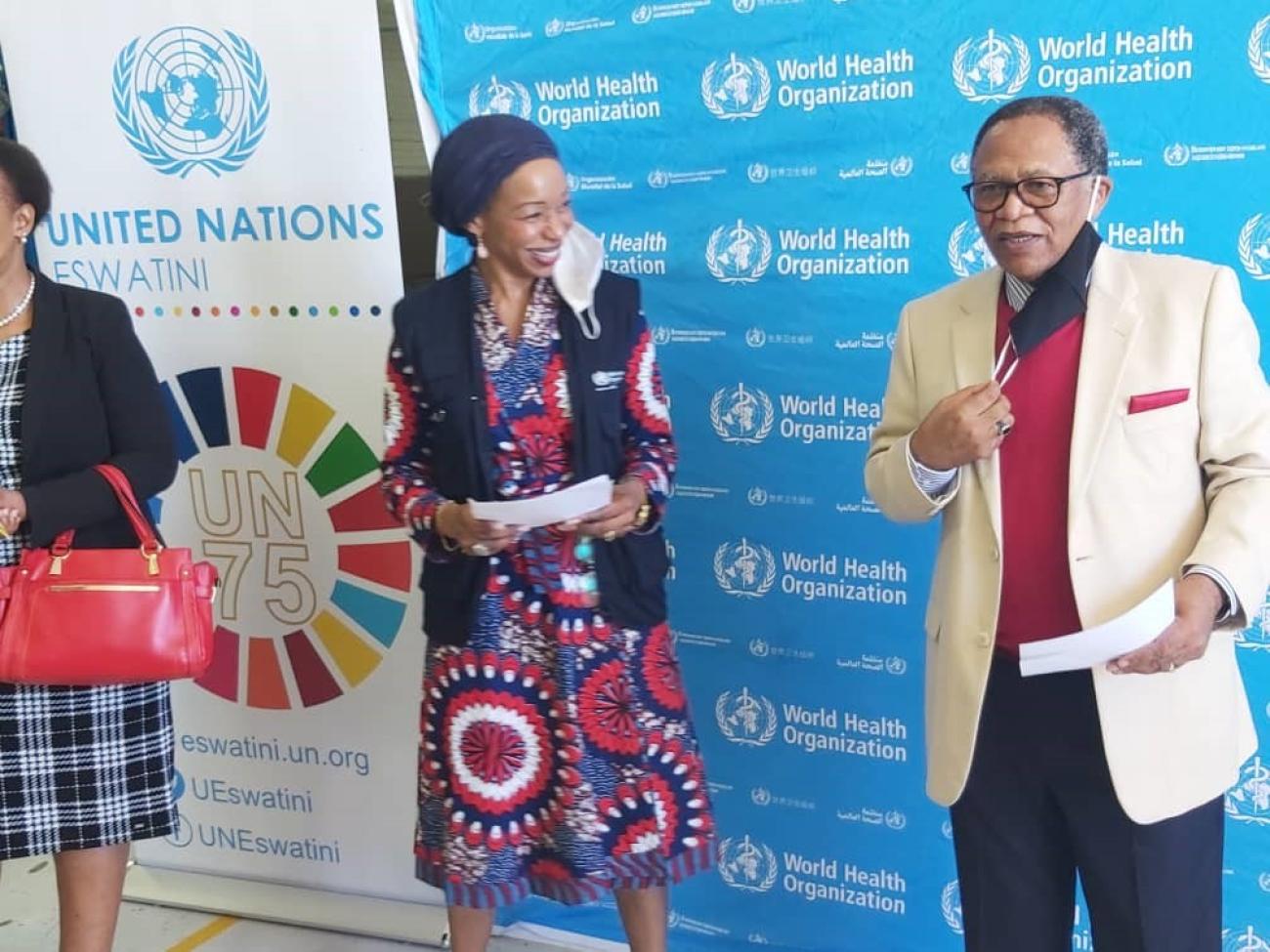UN Resident Coordinator Hands-Over Medical Equipment in Support of the Nation's COVID-19 Response

In an act of profound solidarity with the people of Eswatini and the Government, the UN Resident Coordinator hands-over medical equipment worth E3 million.
On Monday, 20th April, on behalf of the United Nations in Eswatini, the UN Resident Coordinator, Ms Nathalie Ndongo-Seh, handed-over medical equipment for health workers in an act of profound solidarity with the people of Eswatini and support of His Majesty’s Government’s fight against COVID-19.
The medical equipment valued a total of E3 million and included: surgical masks, N95 masks, goggles, gloves, face shields, gowns, thermometers, ventilators and COVID-19 testing kits.
Kindly received by Deputy Prime Minister, His Excellency Themba Masuku, on behalf of the Government of Eswatini, the hand-over of medical supplies took place at the Central Medical Stores, Matsapha.
The lifesaving supplies were brought to Eswatini by the UN Solidarity Flight: a joint effort by the World Health Organization (WHO), the World Food Programme (WFP), the African Union, the Jack Ma foundation, the Governments of Ethiopia and the United Arab Emirates.
The items were donated as a symbol of the friendly relationship between the Government of Eswatini and the United Nations. They also demonstrate the unity promoted by the African Union, supported by Member States and key partners in solidarity with the Kingdom of Eswatini.
During the month of April, the UN is focussing on Sustainable Development Goal (SDG) 3: Good Health and Well-being – aiming to bring health and well-being to all in Eswatini. Every month, the United Nations places one of the 17 SDGs under the spotlight, highlighting its purpose, targets and criticality in advancing Agenda 2030. Despite the challenges brought by the COVID-19 pandemic, focussing on SDG 3 provides an opportunity to reflect on the progress made in ensuring healthy lives and well-being for all people at all ages.
The donation comes at a time when Personal Protective Equipment (PPE) for healthcare workers battling on the frontlines against COVID-19, is desperately needed. As of 20th April, the Kingdom of Eswatini has 24 confirmed COVID-19 cases in the country.
The UN Resident Coordinator urged that all measures and mechanisms to prevent the spread of COVID-19 are enhanced, calling for: strengthening of the public health response while finding cases, providing care and isolation, contact tracing and isolation; launching a robust and aggressive public awareness and sensitization campaign that reaches out to all individuals and communities in urban and rural areas; strictly enforcing precautionary measures in compliance with the lockdown, staying at home, practicing hand-washing several times a day, limiting movements to those of an essential manner, respecting physical distancing, wearing masks in public, including cloth masks, not attempting to share masks.
Ms Nathalie Ndongo-Seh continued, stating; “As the UN, we support measures that are people-centred and as such, ensure that medical care is provided; enable people to access basic necessities during the lockdown; mitigate increase in vulnerabilities as a result of COVID-19; mitigate socio-economic impacts; and respect the human rights and the dignity of all.”
Reflecting on the words of WHO’s Director General, the UN resident Coordinator encouraged all emaSwati to; “keep your distance, clean your hands, cough or sneeze into your elbow, and avoid touching your face.” Following recent reports by the media that people are sharing masks, Ms Ndongo-Seh remarked that; “We discourage in the strongest possible terms the sharing of masks. As the Minister of Health indicated, sharing of masks will facilitate the fast and uncontrollable spread of the virus.”
In her closing words, the UN Resident Coordinator continued that; “COVID-19 is disrupting our societies, but it cannot, and must not, shake our foundations and resolve to save and protect every single life. It is our sincere hope that those medical supplies will be utilized effectively and save lives.”


